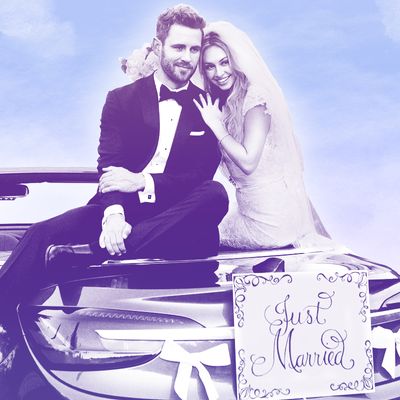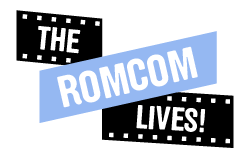
At its best, the rom-com embodies a sincerity and hopefulness that seems utterly at odds with The Bachelor franchise. Drunken women battling each other in gladiatorial “group date” settings for the chance to spend ten demeaning minutes alone with the chosen man? Trying to make a relationship work with a promising guy while some villain character sneaks off to have sex with him in the middle of the night? A smug host who stops by to ask blandly insulting questions about your true feelings? This is not the stuff of rom-com lore. This is a dystopian nightmare.
And yet, The Bachelor may still be the closest thing to a standard rom-com on TV right now. The whole point of a traditional romantic comedy — and of a traditional romance, going back much further in fiction — is that it has an end point. Two people meet, they overcome obstacles to get together, they finally accept that they love one another, the end. The story of romance in the 20th and 21st centuries has complicated that narrative, often updating it to reflect a new social landscape. They are romance novels that tell queer stories, romance heroines who end with both partners and ambitious careers, and romantic comedies that pitch their heroes and heroines not as worthy angels but as disasters that aren’t fixed once they find love. For the most part, though, even these progressive stories rely on a specific end point. Meanwhile, the usual rules of successful TV are fundamentally opposite to such a defined structure, which makes the challenge of creating a high-stakes romantic narrative particularly tricky: Romantic comedies need to end, but a TV show needs to keep going as long as it can. How can you build a strong rom-com after your characters get together and your show is renewed? Or if you’re canceled before their first kiss?
Enter The Bachelor. At the beginning of the season, a person looking for love will encounter many potential candidates. At the end, we are promised, they will be in love. (Brad Womack excepted.) Sure enough, with the clockwork regularity of a ’90s rom-com starring Jennifer Lopez, or a Regency romance novel, the end of each season delivers us a portrait of love finding a way. There’s an ebullient embrace, we get the delightful romance trope of people finally experiencing the relief of declared love, there are soaring strings, and it all takes place in an exotic location. The couple rides off into the sunset, and next season we get to watch love blossom between new lovers once again.
More than any scripted TV show, The Bachelor and Bachelorette stick to this well-worn marriage plot structure, in both the beginning-to-end narrative and the season-to-season repetition. (It also hews most closely to the 19th- and early-20th-century ideas of what a romance should look like: conventionally attractive, straight, white people.) Just like the sun rises in the east, there will be a simulacrum of love at the end of a Bachelor season, there will be something resembling a marriage proposal, and the sad story of two people made socially useless by their singleton status will be resolved. It’s a tale as old as time, if by “time” you mean “as old as the idea of romantic love, which is in fact a relatively recent invention in the scope of human existence.”
The next question, then, is what makes a hacky, throwback-y, politically regressive, demeaning, reductive, manipulative show like The Bachelor at all “modern.” And to that I say: Have you seen this show? It is one of the strangest, most self-aware, most weirdly ambiguous TV productions around, and that’s including The Young Pope. It’s a show that simultaneously promises that its contestants will fall in “real” love, while also showing you small snippets of the producers meddling with the process. It’s a show that begins each season with unimaginably transparent ratings ploys and overproduced manufactured drama, and then somehow, each season, transitions into wide-eyed assertions of authenticity. The Bachelor is like a con man who’s caught in the act but stubbornly refuses to drop the con, leaving you with a persistent nagging doubt of your own: Maybe it is real?
That strange, frustrating, ambiguously self-aware gaslighting sensation? It’s become a defining element of modern media, and if you want to get academic, it probably launches The Bachelor beyond “modern” and well into postmodernity. That’s especially true once you consider the weird pastiche of media surrounding the franchise. There’s the show, and the after shows, the After the Final Rose specials, the Good Morning America appearances, Bachelor in Paradise, and then there’s … everything else. The tabloid covers, the podcast appearances, the social feeds of current and former contestants, the spoiler blogs, the recaps, the GIFs. It is a bizarre, self-feeding ecosystem, and it all always stumbles over the same exact existential questions. Is their love real? Is any love real? How can we know? And, the most postmodern question of all: Ultimately, does it even matter if the love is real?
The show itself does not ever ask that question — not directly. Its glossy surfaces are fully invested in maintaining the perfect bubble of its franchise, because The Bachelor and its massive supporting landscape of media are what create and sustain its fans — it’s Bachelor nation. But the very existence of the supporting tabloid coverage, which usually focuses on either building or dismantling a couple’s Bachelor mythos, constantly undermines the authenticity of the relationships depicted on the show. It pokes holes and casts doubt, and yet the show rolls on season after season, mostly unchanged. So does it matter if the love is real? Probably not.
In perhaps its most modern twist, The Bachelor gets to have both the happy ending inherent to its genre and the inevitably unhappy aftermath. We watch the couple embrace each other joyfully, and then we need only stay tuned for After the Final Rose to watch them sit uncomfortably next to one another on a sofa. If you prefer the modern rom-com that finds love but then shifts to the mundane facts of reality — shows like Jane the Virgin or Catastrophe — you can follow the Instagram accounts of those couples who have actually made it. Their insistence on living normal, everyday lives will remind you that the romantic comedy is always a construct … until their sponsored content posts undermine that revelation yet again.
It’s the combination of all of this — all the messiness, emotion, ambiguous motivation, and fame thirst harnessed within the drumbeat regularity of each season finale — that makes The Bachelor the quintessential rom-com of our time, or at least, the rom-com we deserve. It’s the one that best combines all the modern brand awareness and self-conscious performativity with the old fairy-tale dream. It marries the genre’s tried-and-true structure of matchmaking and resolution with the self-awareness and ambiguity of the modern rom-com. It is a mess. It is pristine. It is true love. And if it’s not, there’s always next season.



